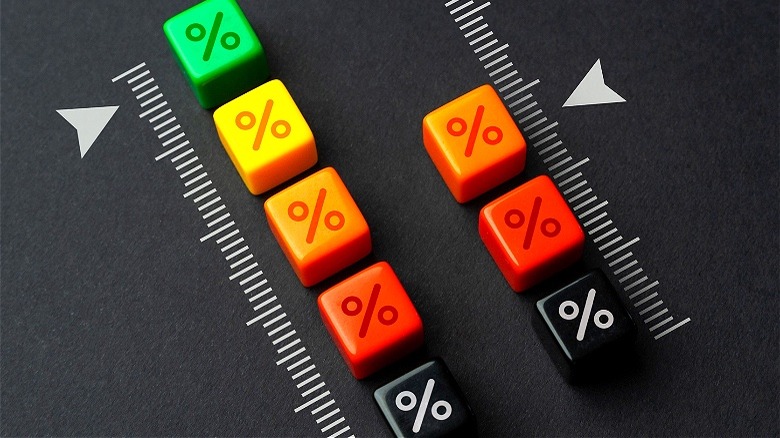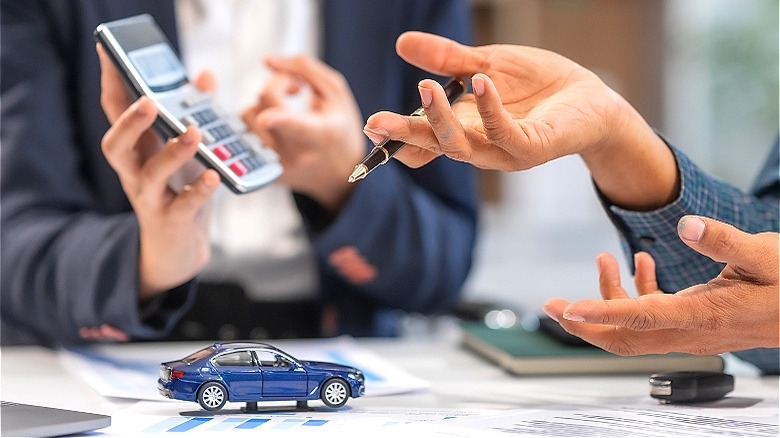You've Been Warned: This Sneaky Auto Financing Tactic Will Cost You
Buying a new car is a virtual minefield of gotchas for the average consumer. In the past, Money Digest has discussed various sneaky ways car dealers trick you into spending more money. However, a new low for car dealerships exists in what's been nicknamed "yo-yo financing." In the same way that the toy yo-yo winds itself back into the hands of the player, automotive retailers want to reel unsuspecting car buyers back into the dealership after they thought their purchase was already complete.
Imagine cruising around for a few days in the bliss of that new car smell (and also perhaps showing off your new whip to friends and family), only to receive a phone call from the dealership that your financing has fallen through and you'll need to rush back. Well, that's exactly what can happen if you fall victim to a yo-yo scam. To be sure, there are legitimate reasons for what's called "spot delivery" of a vehicle. That is, a car buyer is allowed to leave with their new vehicle, despite the fact that the financing may not be 100% complete.
An example of appropriate spot delivery occurs when a vehicle is sold during a time that banks or other lenders are closed, such as in the evening or over the weekend. Even though one or more banks may be closed, the dealership can still perform a credit check and reference a chart listing interest rates for different scenarios. That gives the dealer confidence that it can later arrange financing per the terms agreed upon in a contract that the buyer signs.
The renegotiated terms will be poor
Where the situation turns from a legitimately necessary spot delivery to a yo-yo scam is when an unscrupulous automotive retailer offers customers an attractive deal they know they can't fulfill just to make the sale. For instance, a too-low down payment or teaser interest rate. The buyer leaves with the vehicle, then is contacted a few days later to return to the dealership to renegotiate the financing terms. Some particularly menacing bad actors might even threaten to report the vehicle as stolen or have it repossessed if the buyer doesn't come back to the negotiating table.
As you may have already guessed, the new financing will carry a significantly higher interest rate than the previously agreed upon rate. And this scam has been around for some time. According to a 2012 report by the Center for Responsible Lending, which gathered data on 2,100 consumers from five organizations that helped them with auto finance-related issues, 27% of those clients reported that they had experienced a yo-yo scam when car buying. Further, these same clients reported, on average, that the new interest rate offered was five percentage points higher than their risk level would suggest.
That means that if you agreed to an interest rate of 5% — perhaps rightly deserved based on credit score and other factors — the dishonest dealership's finance department could try to stick you with an interest rate of 10%. If borrowing $30,000 for a term of five years, that's a difference in payment between $566 per month and $637 per month, or more than $4,200 in extra interest expense over the life of the loan. On a longer loan, like a 96-month car loan (which you should avoid, anyway), the consequences would be even worse.
Dealerships profit from higher interest rates
If you're wondering about the dealership's motivation for yo-yo sales, it's extra profit, of course. Per the Federal Trade Commission, ~70% of car buyers obtain their auto loans through a car dealership's financing department. That's as opposed to financing directly with your own bank or credit union.
While you're sitting (uncomfortably) in the finance manager's office, they will obtain what's called the "buy rate" for your vehicle's transaction, which is the interest rate at which its lending partner(s) are willing to offer financing based on your credit score and other credentials. At this point, the car dealership's finance manager is free to add what's called a "markup" or "dealer reserve" on top of the buy rate. This interest rate markup is discretionary and represents pure profit to the dealership. For example, a lender agrees to finance your new car at a 6% interest rate, but the finance manager shows you a figure of 8% for the same exact loan. That 2% difference is extra revenue for the dealership.
For better or worse, the above scenario is commonplace in the auto industry and a good reason to research your loan eligibility and interest rates ahead of time. However, what's even worse is if you actually signed a contract at 6% and drove off into the sunset — only to later get called back to the dealership to re-sign at the higher 8% rate. That yo-yo tactic is extra dubious.
What can you do as a victim of yo-yo financing?
Perhaps you've taken spot delivery of a car and the dealership can't arrange financing at the agreed-upon interest rate. Or worse, you suspect that you're the victim of a more calculated yo-yo financing scam. The good news is that, overwhelmingly, you'll likely be able to return the car to the dealership with no penalty whatsoever. That's because most purchase contracts spell out exactly what happens if conditional financing terms aren't able to be met.
If the repercussions surrounding conditional financing aren't clear, be sure to ask specifically. As well, get everything in writing and keep copies of all paperwork. Finally, don't feel pressured to buy a car or sign a contract if you feel uncomfortable. Armed with the proper recourse, you'll be able to return the new vehicle to the dealership and receive a refund for any down payment. You'll also be able to get your trade-in car returned, if you did indeed have a trade. If your trade-in was already sold, you'll receive cash compensation in that amount instead.
To proactively avoid any car-buying snafus, research your auto loan offers with local and/or online lenders ahead of time. That way, you will be armed with the knowledge that you're not getting ripped off with a higher-than-necessary interest rate. Or, in the case of the yo-yo scam, an offer that's too good to be true. For more pointers, see our list of things you should never say when buying a car.



